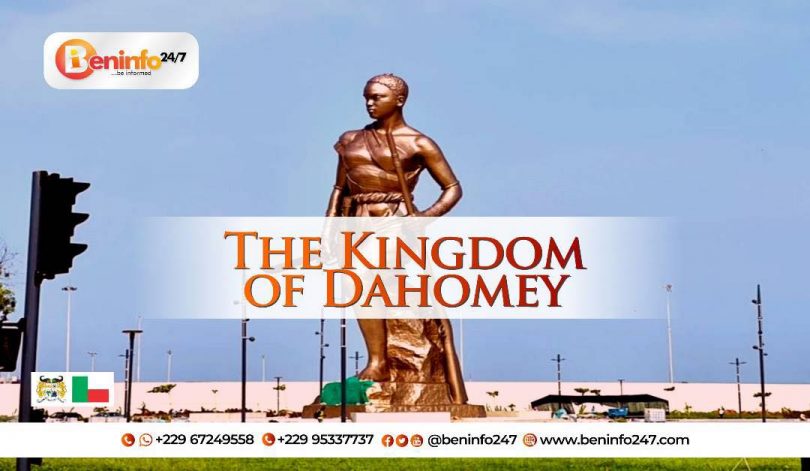The Kingdom of Dahomey
The Kingdom of Dahomey: A Brief History, The Role of Art in Beninese Culture, Traditional Beliefs and Religions in Benin, and The Slave Trade and its Impact on Benin’s History
Introduction
The Kingdom of Dahomey, in West Africa, was a strong African empire that gained notoriety in the 17th century and flourished until the late 19th century. Although European colonialism has largely obscured its legacy, the Kingdom of Dahomey was instrumental in forming the history and culture of the area. The history of the Kingdom of Dahomey, including its ascent to power, its political and economic structures, and its eventual fall, will be examined in this article. We will also explore the significance of art in Beninese culture, the traditional religious practices of the Beninese people, and the historical effects of the slave trade. We can learn more about the factors that have influenced West Africa and its people by studying the lengthy and intricate history of the Kingdom of Dahomey.
History of the Kingdom of Dahomey
During the 17th through 19th centuries, the area that is now modern-day Benin was home to the mighty West African kingdom known as the Kingdom of Dahomey. The Fon people, who moved to the region in the 1600s, established the kingdom.
Dahomey expanded its power and wealth through trade, conquest, and the slave trade during the rule of King Houegbadja. Houegbadja built a complex system of government and social organization, including a caste system that separated society into aristocracy, commoners, and slaves.
Dahomey rose to prominence for its military strength and its elite all-female military regiment, the Amazons, in the 18th and 19th centuries. The Amazons were well-trained, dreaded by their foes, and had an important role to play. The Amazons were crucial to the growth and security of Dahomey because they were well-trained, feared by their adversaries, and a formidable force.
But Dahomey’s participation in the slave trade ultimately contributed to its demise. In the 19th century, when European nations started to outlaw slavery, Dahomey sought to find new sources of money and power. In the end, the kingdom was subdued by French forces in 1894, and it was made into a French colony.
The culture and traditions of Benin, as well as the artwork and artifacts produced during the height of the kingdom’s power, are examples of how Dahomey’s legacy is still present today.
The Role of Art in Beninese Culture
Beninese culture is not complete without art, which has also had a big impact on the history of the nation. Art was a medium of communication and a way of transferring cultural values and ideas from one generation to the next in traditional Beninese culture.
Benin has a varied range of artistic expressions, including metallurgy, weaving, ceramics, and sculpture. These artistic disciplines frequently reflect various facets of life, such as religious convictions, social standing, and political influence.
The bronze and brass statues produced under the Kingdom of Benin are among the most well-known works of art from that country (not to be confused with the Kingdom of Dahomey). For the royal court, these statues served as emblems of authority and status. The king, his family, and other significant members of the realm were portrayed.
Today, Beninese art is still thriving and esteemed both domestically and abroad. Several Beninese artists have achieved international acclaim for their work, and the nation is home to numerous museums and art galleries that display both traditional and contemporary art.
Religions and traditional beliefs in Benin
Benin has a lengthy, illustrious spiritual and religious history. In addition to more contemporary religious influences like Christianity and Islam, traditional religious traditions are still firmly rooted in the culture.
Benin’s indigenous religion is Vodun, sometimes referred to as Voodoo. Vodun is an animist religion that places a strong emphasis on respecting ghosts and ancestors. Vodun practitioners hold the belief that everything in the world—including trees, rivers, animals, and even rocks—is home to spirits.
Benin celebrates Vodun through a range of rites and ceremonies that are an integral part of daily life. These festivities, which are an essential component of Beninese culture, frequently feature drumming, dancing, and singing.
Benin is a country where many people practice Christianity and Islam in addition to Vodun. Portuguese traders brought Christianity to Benin in the 15th century, and the nation now has a sizable Christian population. Through trade with the Hausa people, Islam was brought to Benin in the 19th century, and today, Muslims constitute a sizeable minority of the country’s population.
Traditional religious practices like Vodun continue to play a significant role in Beninese culture and identity despite the influence of these more modern religions. The beliefs of the many Beninese who combine traditional and modern religions continue to influence the culture and way of life of the nation.
The Slave Trade and its Impact on Benin’s History
As was the case for many African nations, the slave trade was a terrible chapter in Benin’s history. The effects of the slave trade were not limited to the Kingdom of Dahomey. In fact, during the 18th and 19th centuries, Dahomey was one of the principal slave-trading kingdoms in West Africa.
The economy, politics, and culture of Dahomey were all significantly impacted by the slave trade. Raids and conflict increased in Dahomey and its neighboring states as a result of the demand for slaves by European traders. The slave trade’s financial gains were used by the rulers of Dahomey to strengthen their armed forces and enlarge their realm.
The people of Dahomey suffered greatly as a result of the slave trade. More persons were slain in conflict than were seized and sold into slavery. The loss of so many people left a profound mark on Dahomey’s social and cultural fabric.
In addition to directly affecting Dahomey, the slave trade had significant repercussions for all of Africa. When resources were diverted from local development to the slave trade, it contributed to the underdevelopment of many African nations. Traditional social and economic structures were upended by the slave trade, which resulted in long-term instability.
Notwithstanding the effects of the slave trade, Benin has developed into a strong, dynamic nation with a rich cultural history. Nowadays, the people of Benin are still proud of their history and optimistic about the future.
In conclusion, the history of Benin is a rich tapestry of culture, tradition, and resilience in the face of adversity. The Kingdom of Dahomey stands out as a powerful and formidable force in West African history, and its legacy continues to inspire and captivate people around the world. The role of art in Beninese culture, as well as the traditional beliefs and religions that have shaped the country’s history, continue to be celebrated and practiced to this day. The impact of the slave trade on Benin’s history cannot be ignored, but it is important to remember that the country’s story goes far beyond this dark chapter. As Benin continues to move forward, it is vital to remember and honor its past, and to celebrate the unique and vibrant culture that has emerged from it.
ALSO, READ
Everything You Wanted to Know About Culture And People Of Benin Republic










 Protected by Patchstack
Protected by Patchstack